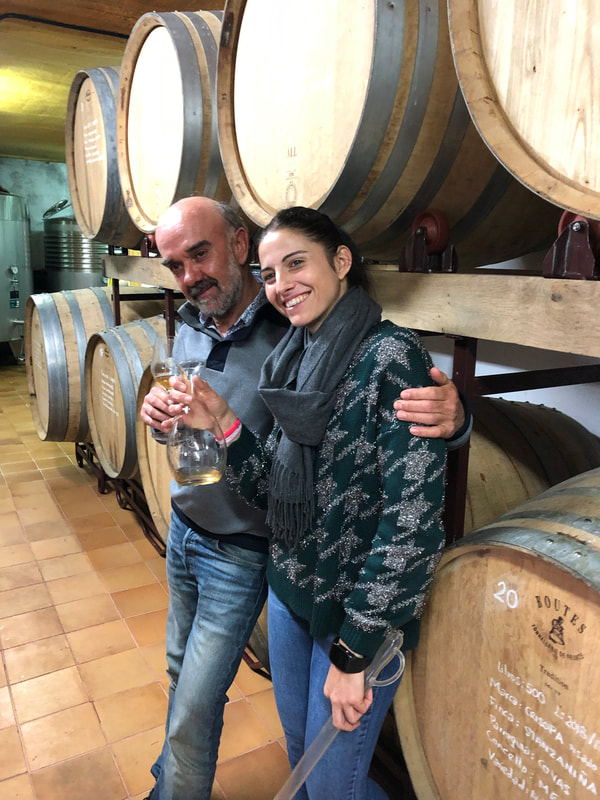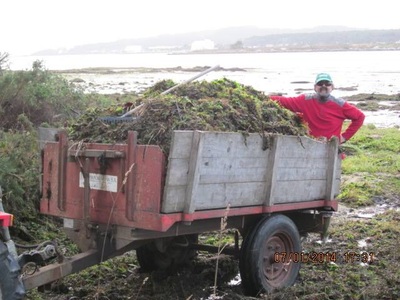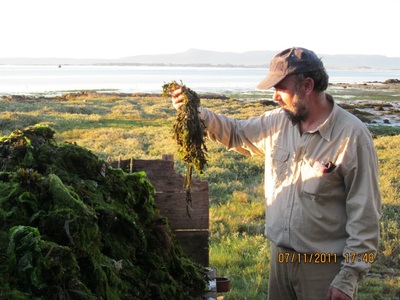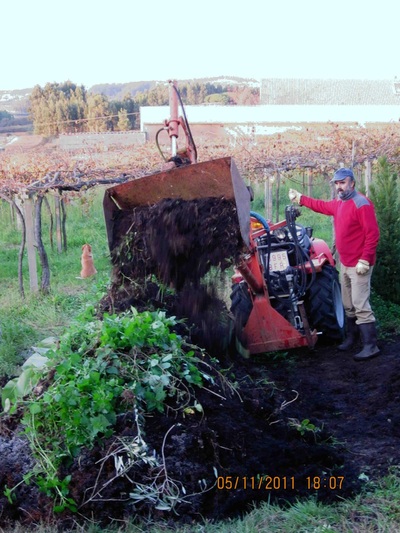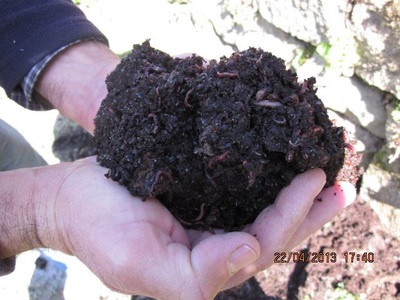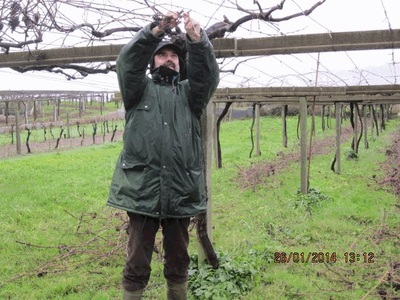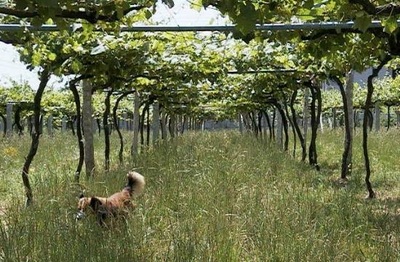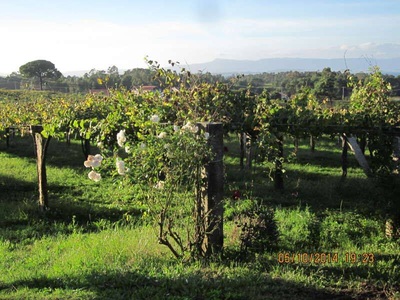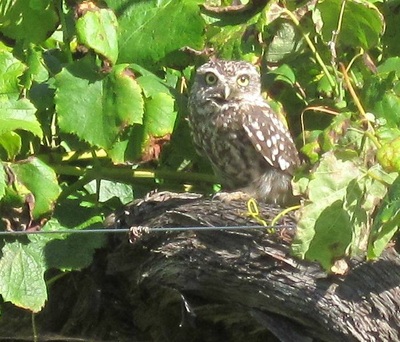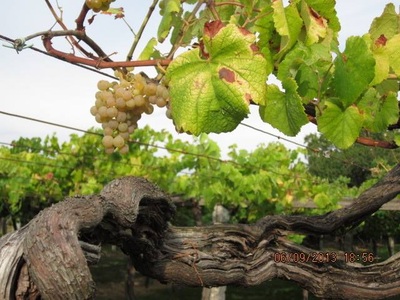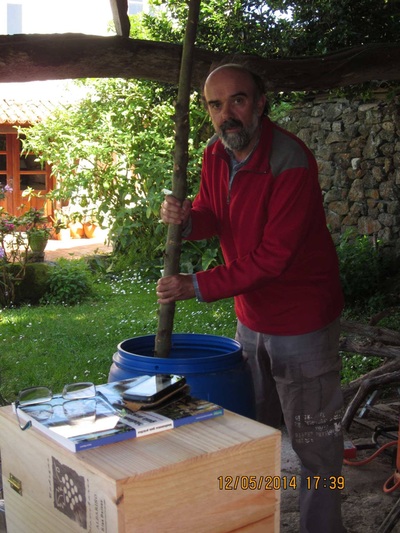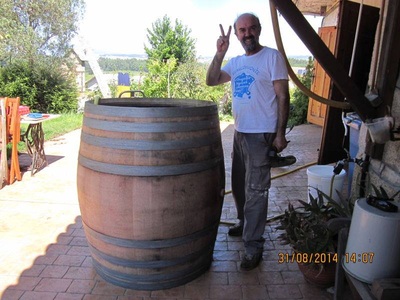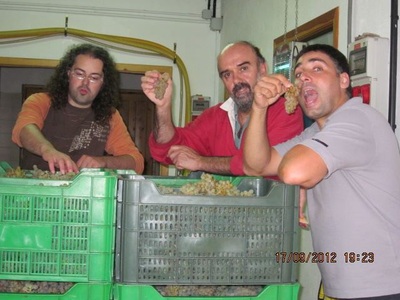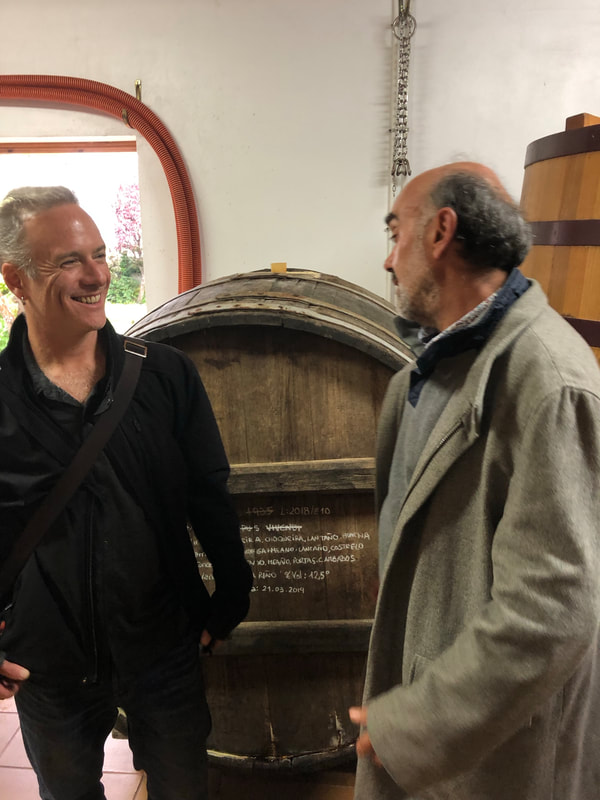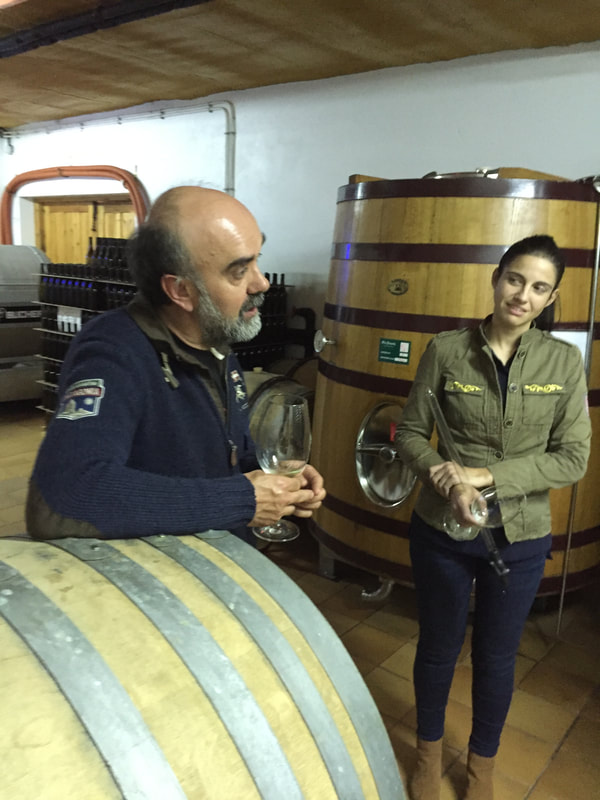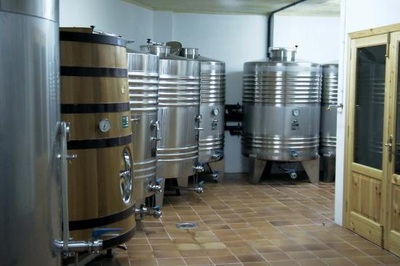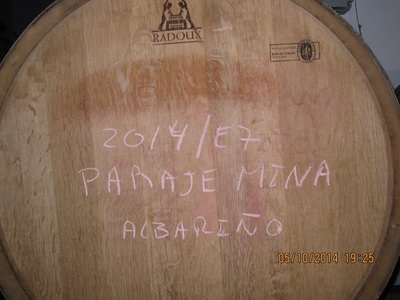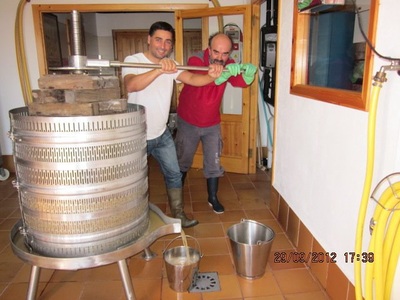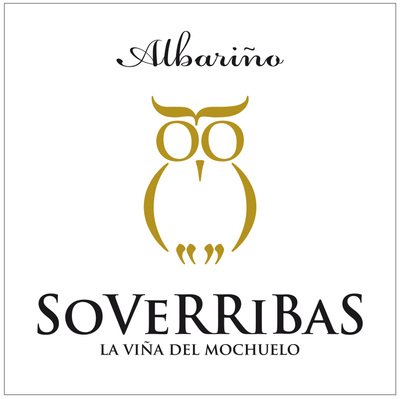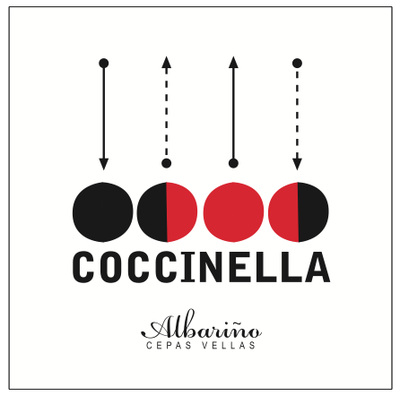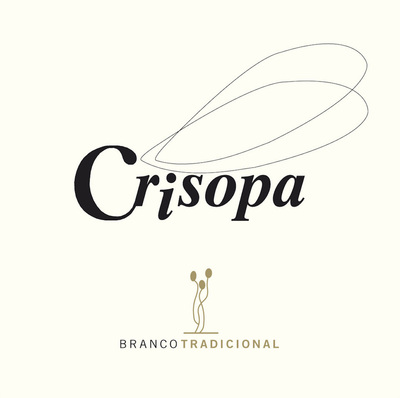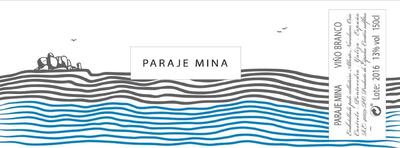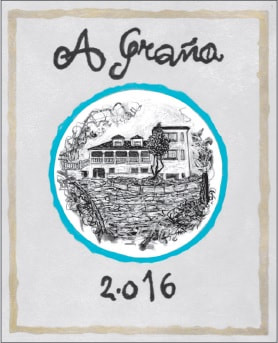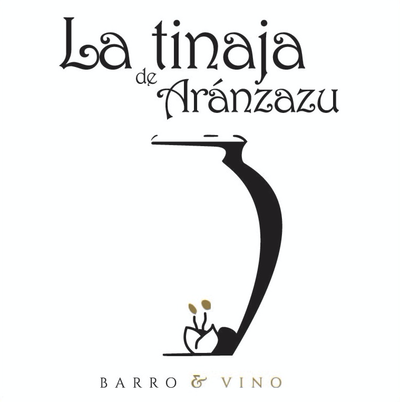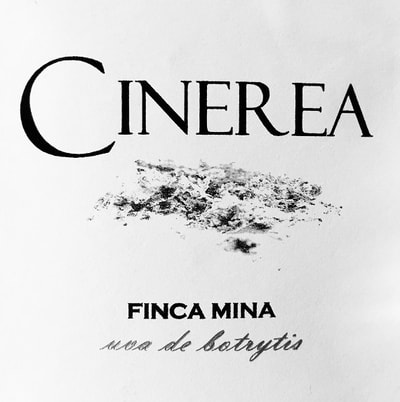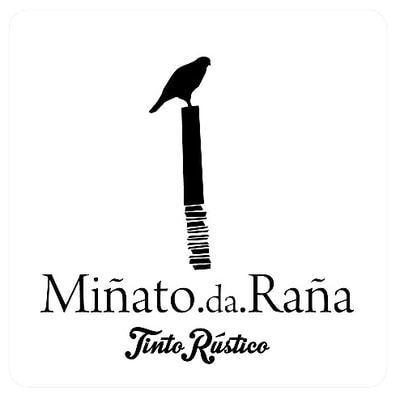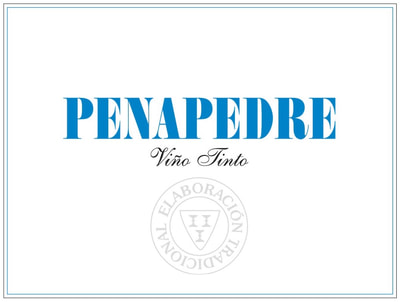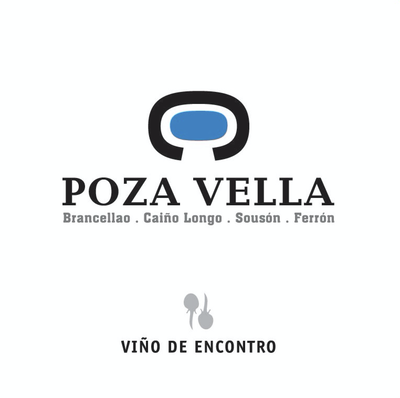Nanclares y Prieto
Alberto Nanclares and Silvia Prieto make transparent, Atlantic-influenced wines, mainly with Albariño from old vines around the village of Cambados. Employing organic farming practices and a restrained hand in the cellar, the pair have managed something very rare: the refinement of Albariño into angular, age-worthy wines that express the fascinating terruños of Cambados and Rías Baixas.
The story of their collaborative project begins with Alberto’s decision to move to Rías Baixas, to unwind his career by the Atlantic. Alberto, who had worked as an economist, loves the sea and sailing. He and his wife came to Rías Baixas in 1992 and settled in the seaside parroquia of Castrelo, just a few kilometers away from the most historic and traditional village for Albariño wines, Cambados. By happenstance, the small home they purchased came with some vineyard land. Initially, Alberto had no plans to make wine, but the idea of farming grew on him, and he began to work his vines with the assistance of neighbors. Alberto invested in some wine-making tools and established a tiny winery in his garage in 1997. In the beginning, Alberto farmed conventionally but quickly became disenchanted with the use of chemicals. Gradually, based on his own observations in the vineyard and of the finished wines, he moved away from the systematic herbicide and pesticide use, eventually eliminating chemicals altogether. After working with an enologist for several years, Alberto took over full time winemaking duties for his Nanclares wines in 2007. Silvia Prieto was born in Pontevedra, the closest city to Rías Baixas. Her journey with wine began in 2003 at wine-tastings in the area, and she first met Alberto in 2009. A lab technician by training, she founded her own company that provided analysis and consultation for wineries and winemakers and emphasized traditional approaches without additives and organic viticulture. Her acquaintance with Alberto continued and developed, and she proceeded to join the project in August of 2015 first for the harvest and then as a partner. It has turned out to be a fortuitous pairing. Alberto and Silvia have different backgrounds and personalities but come to winemaking with a meticulous and restless intensity that has only increased in their time together. Together they have expanded production and simultaneously deepened their focus. Their bond is expressed in a shared desire to improve, constantly questioning their approach and themselves to refine their craft. The sequence of new wines, from new vineyard plots, made in different vessels or even from different grapes and regions reflects their tireless search to understand, to create, and to translate terroir. In discussing their wines, they are never satisfied, always finding a way to improve their work and its results. This conversation informs the whole of the project: Alberto and Silvia work together as equal partners in the vineyard and the cellar, and the wines express their collaboration. The essence of their approach is reverence for the vineyard, from organic farming to fermentation by native yeasts: "In the winery, we respect the grapes as much as possible, we don't use any winemaking additions besides moderate amounts of SO2. We do not ferment with pie de cuba (pied-de-cuve) in order to preserve the identity of each vineyard," Alberto says. To express the edginess of the naturally high in acidity Albariño grape, he does not add potassium, which is what many in Rías Baixas use to de-acidify and soften their wines. Malolactic fermentation rarely occurs, and the wines spend a good amount of time (often a year or more) on their lees before being bottled without clarification or filtration. Alberto and Silvia currently own 5 hectares of Albariño in the Val do Salnés, all trained in the traditional Pergola style and divided into 12 small parcels in the parroquias of Castrelo (South Cambados), Vilariño (North Cambados) and Padrenda (North Meaño). The grapes from these plots, vinified separately, yield the core of the Nanclares y Prieto wines: Albariño de Alberto Nanclares, Paraje Mina, Soverribas, La Tinaja de Aranzazu, Coccinella, Crisopa, and Cinerea. Alberto and Silvia also work with other farmers around Rías Baixas to produce the wines A Graña, Dandelión, Tempus Vivendi, O Bocoi Vello de Silvia, and A Senda Vermella. The Wines
Dandelion is Albariño from a collection of plots in Meaño, Combados, Ribadumia, Meis, and Barro. The vines are 25-45 years old, and the plots are largely west facing and planted on sandy granitic soils. The grapes were harvested by hand, sorted, and gently pressed without destemming in whole-bunches using a pneumatic press. The juice ferments with its native yeasts in stainless steel tank, then rests on the lees for 7 months in a mix of vessels, with weekly batonnage for the first month.
Tempus Vivendi is Albariño from a number of plots in and around Sanxenxo. The vines are 25-45 years old, and the plots are largely south and west facing and planted on sandy granite and clay. The grapes were harvested by hand, sorted, and gently pressed without destemming in whole-bunches using a pneumatic press. The juice ferments with its native yeasts in stainless steel tank, then rests on the lees for 7 months in the same vessel, with weekly batonnage for the first month. O Bocoi Vello de Silvia is Albariño from several plots in Sanxenxo and Meaño. The vines are 25-95 years old, and the plots are largely west-facing and planted on a mix of clay, granodiorite, and sandy granite soils. The grapes were harvested by hand, sorted, and foot-stomped in the ancient method, with about two days of maceration on the skins and stems followed by a gentle pressing in a pneumatic press. The juice ferments with its native yeasts in reconditioned 90+-year-old 1900L chestnut barrels, then rests on the lees for 7 months in the same vessel, with weekly batonnage for the first month. Albariño de Alberto Nanclares is Albariño from 8 of Alberto and Silvia’s parcels in Cambados and Portas: Soverribas, Praeira (Facho), Tomada de Juana, Albarellos, Senra, Gandarela, Freixido, and Monte Xago. The vines range in age from 15 to 45 years and the plots are largely east-facing and planted on a mix of decomposed granitic soils and sandy loam. The grapes were harvested by hand, sorted, and gently pressed without destemming in whole-bunches using a pneumatic press. The juice ferments with its native yeasts in used French oak barrels, then rests on the lees for 9 months, with weekly batonnage for the first month. Paraje Mina is Albariño from Alberto and Silvia’s Finca Paraje Mina vineyard, in Cambados. The west-facing vines are more than 30-years-old, and the soils are deep granitic sands. The grapes were harvested by hand, sorted, and gently pressed without destemming in whole-bunches using a pneumatic press. The juice ferments with its native yeasts in 500L stainless steel tank and a single 500L used French oak barrel, before resting on its lees for 9 months, with weekly batonnage for the first 3 months. Soverribas is Albariño from 3 of Alberto and Silvia’s parcels: Manzaniña in Meaño and Ixertal and Casal in Ribadumia. The vines range in age from 35 to 100 years and are largely west-facing and planted on sandy, granitic soils and clay deposits. The grapes were harvested by hand, sorted, and gently pressed without destemming in whole-bunches using a pneumatic press. The juice ferments with its native yeasts in a 2200L used French oak barrel before resting on its lees for 9 months, with weekly batonnage for the first month. La Tinaja de Aranzazu is Albariño from two of Alberto and Silvia’s parcels: Paraje Mina in Cambados and Inxertal in Ribadumia. Paraje Mina faces west, while Inxertal faces southwest. The vines range in age from 35-90 years and the soils in both parcels are sandy and granitic. The grapes were harvested by hand, sorted, and gently pressed without destemming in whole-bunches using a pneumatic press. The juice ferments with its native yeasts in clay tinaja before resting in the same vessels on its lees for 9 months, with weekly batonnage for the first 3 months. Coccinella Cepas Vellas is Albariño from the oldest centenarian vines of Alberto and Silvia’s Ixertal parcel. Inxertal faces south-west, and the soils are sandy and granitic. The grapes were harvested by hand, sorted, and gently pressed without destemming in whole-bunches using a pneumatic press. The juice ferments with its native yeasts in 400L used French oak barrel, before resting on its lees in the same barrel for 11 months, with weekly batonnage for the first 3 months. Crisopa Branco Tradicional is Albariño from Alberto and Silvia’s Manzaniña parcel in Ribadumia. Manzaniña is southwest facing, with 35+-year-old vines on sandy, granitic soils with alluvial clay deposits. The grapes were harvested by hand, sorted, and foot-stomped in the ancient method, and ferment with the skins for 20 days before a gentle press using a pneumatic press into 500L used French oak barrels. The wine ages in the same vessels for 11 months on its lees, with weekly batonnage for the first 3 months. Fogar do Castriño is 100% Albariño from centenarian vines in two parcels in the town of Sisán: Inxertal and A Granxa. Both vineyards are trained in the pergola method and on rich sandy-loam soils over granite bedrock. The grapes were harvested by hand, sorted, and gently crushed whole cluster into a new 500L Chestnut barrel. The wine rested on its gross lees for 24 months, with batonnage for the first month. Bottled without fining or filtering and rested in bottle for 21 months before release. Porta Franca is 100% Albariño from 20-35 year old vines in the O Car vineyard in the Meaño area. The vineyard is trained in the pergola method and is planted on rich sandy-loam soils over granitic bedrock. The grapes were harvested by hand, sorted, and gently crushed whole cluster into a 450L used French oak barrel where they fermented and rested on their lees for 11 months, with batonnage for only the first month. Uniquely, this wine is made with zero sulfur additions and completes malolactic conversion. A Senda Vermella is Caiño and Mencía from several parcels in Rías Baixas. The vines range in age from 15-95 years and are planted on sandy and granitic soils. The grapes were harvested by hand, sorted, and foot-trod in plastic vats, with the Caiño and the Mencía separated. Native yeast fermentation began while the juice macerated with its skins for 21 days before pressing in a vertical press. Malolactic fermentation completed in used French oak barrels and stainless-steel tanks, where the wine rested until bottling. Anfora Vermella is 100% Caiño From vines in the Perdecanai parcel in the Barro area. The vines are pergola trained and range in age from 15-90 years. Planted on rich sandy-loam soils over granitic bedrock. The grapes were harvested by hand, sorted, and crushed by foot, then macerated on their skins and stems and fermented for 21 days before pressing to a 300L clay anfora from Tinajero Padilla. There, the wine rested on its lees for 11 months, with batonnage for the first month. Bottled without fining or filtering and rested in bottle for 21 months before release. Labores da Poda is 100% Caiño from vines in the Perdecanai parcel in the Barro area. The vines are pergola trained and range in age from 15-90 years. Planted on rich sandy-loam soils over granitic bedrock. The grapes were harvested by hand, sorted, and crushed by foot, then macerated on their skins and fermented for 21 days before pressing to a used French oak barrel. There, the wine rested on its lees for 11 months, with batonnage for the first month. Bottled without fining or filtering and rested in bottle for 21 months before release. Pensares de Alberto is 100% Espadeiro from a single parcel (‘Horta’) of 40-year-old vines in the town of Vilariño. The vines are trained in the pergola method and planted on rich sandy-loam soils over granitic bedrock. The grapes were harvested by hand, sorted, and crushed by foot, then macerated on their skins and fermented for 21 days before pressing into a small stainless-steel tank. There, the wine rested on its lees for 11 months, with batonnage for the first month. Bottled without fining or filtering and rested in bottle for 21 months before release. O Son das Pisadas is 100% Mencía from a single parcel (‘Eira Padín’) of 40-year-old vines in the town of Castrelo. The vines are trained in the espaldera method and planted on rich sandy-loam soils over granitic bedrock. The grapes were harvested by hand, sorted, and crushed by foot, then macerated on their skins and stems and fermented for 21 days before pressing into a used 300L French oak barrel. There, the wine rested on its lees for 11 months, with batonnage for the first month. Bottled without fining or filtering and rested in bottle for 21 months before release. Miñato de Raña is 60 % Mencía, 30% Garnacha Tintorera and 10% white grapes (Godello and Palomino) from the centenarian Finca A Raña in O Saviñao, Ribeira Sacra. The terraced vineyard is highly sloped, and the soils are granitic. The grapes were harvested by hand, sorted, and foot-trod with the stems in 600L used French oak barrels. Native yeast fermentation began while the juice macerated with its skins for 15 days before racking into used French oak barrels, where the wine rested on its lees for 9 months, with weekly batonnage for the first month. |
LocationGeneral Info
Tech SheetsVintage ReportsGallery |
